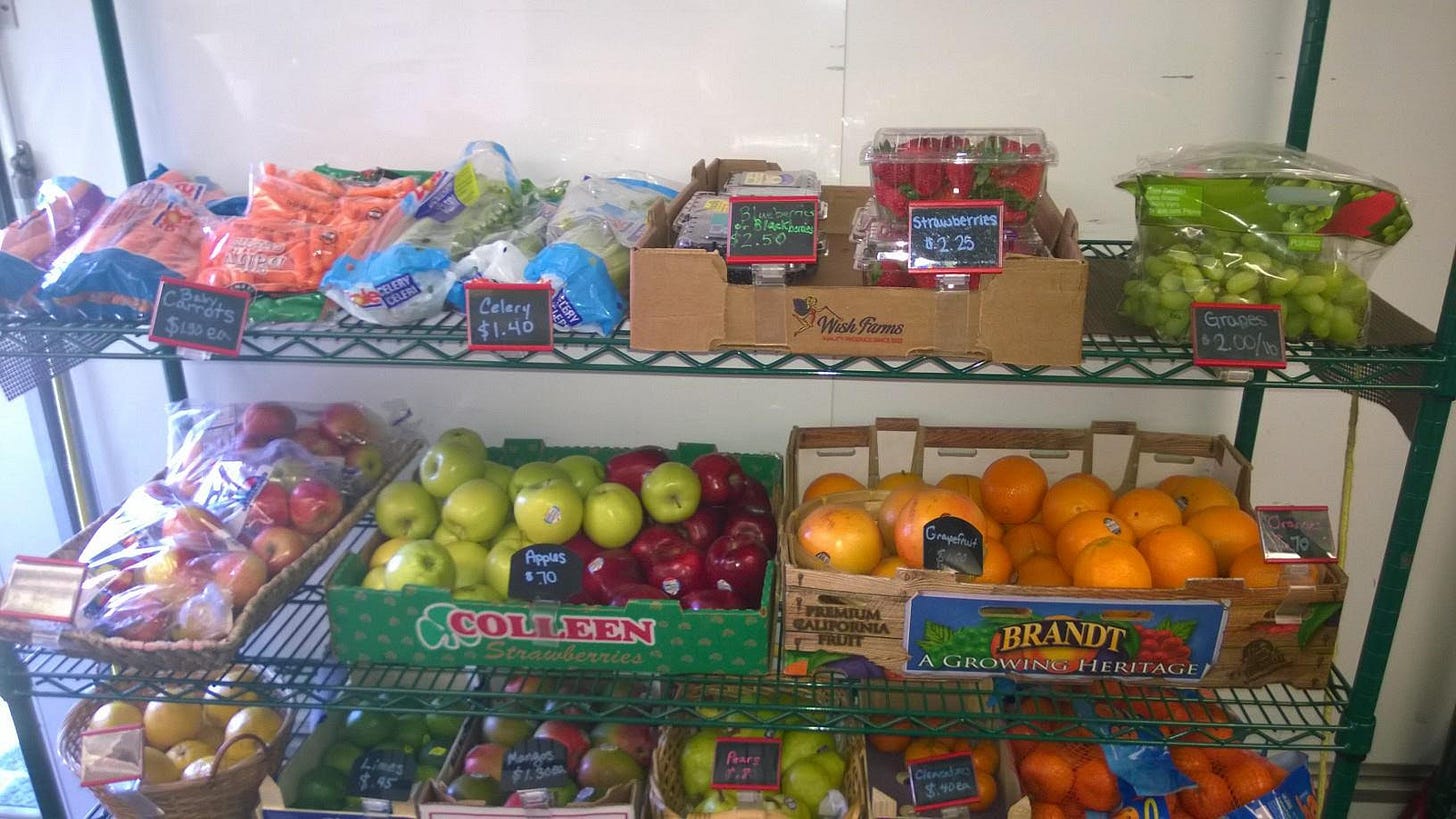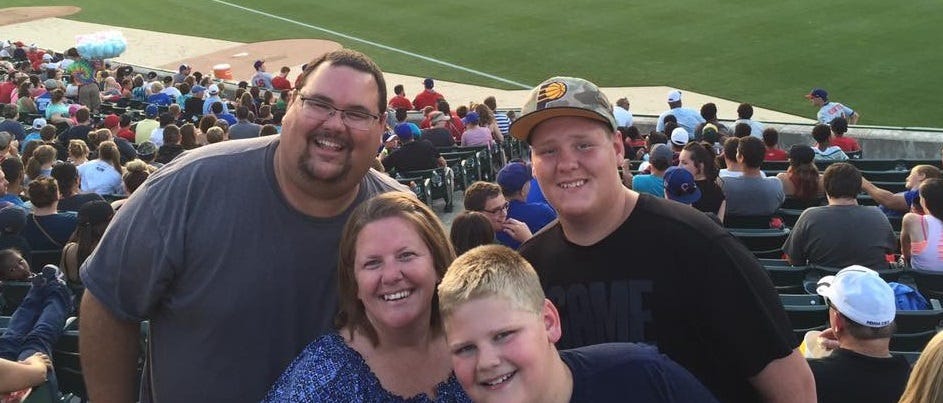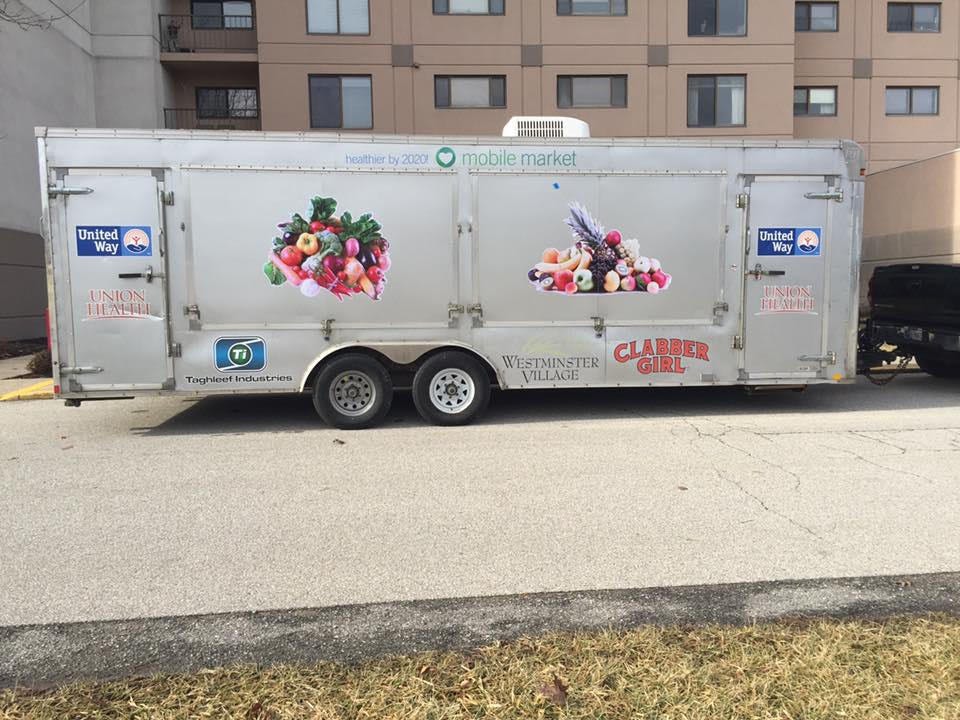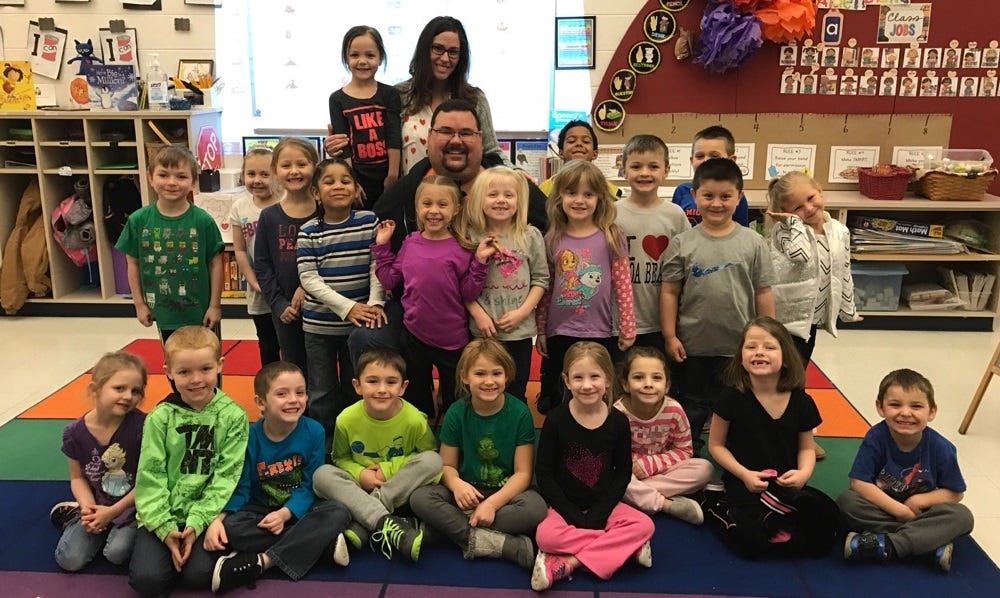Hautian Heroes: Mission of the Market
[dropcap]I[/dropcap] have been fortunate enough to live in big cities that seem to offer all the amenities you could ever check off a list of wants in a place to call home. Right down to opportunities for service. Programs like Big Brothers Big Sisters, the Humane Society and Habitat for Humanity exist just about everywhere. They are programs that provide a chance for any of us to give back to the communities in which we reside. Unless you are directly involved with any of them, you probably take these organizations for granted. Much the same way you take for granted having the ability to get to a grocery store when the next snowpocalypse is on the horizon so you can get the eggs, bread and milk with the rest of the hoard.
Enter the Mobile Market.
The Market is operated by the United Way of the Wabash Valley (UWWV). It is made possible by funding from local sponsors and a grant from the Indiana Association of United Ways. The program began in October of 2013 with a goal of delivering fresh fruits and vegetables to neighborhoods in the Wabash Valley with poor access to grocery stores. Contrary to popular belief, not everyone owns a car. Bus routes do not stop everywhere and in case you haven’t looked, most of Indiana has avoided becoming “bicycle friendly”. Through the Market, affordable, fresh produce can be obtained by people who need it most. The truck drives five days a week, making stops in three different counties.
[divider style="solid" top="20" bottom="20"]
[divider style="solid" top="20" bottom="20"]
[divider style="solid" top="20" bottom="20"]
[divider style="solid" top="20" bottom="20"]
A program like this doesn’t run itself, however. Its Director, Chris Wood, drives the truck pulling the 18-foot refrigerated trailer, full of bananas, peaches, oranges, etc., to 22 different stops, Monday through Friday. I invited Chris to lunch in order to learn more about him, and why he believes in the goals of the Market. What I found, is a man who doesn’t just believe in the mission of the Market, but a man who believes in the mission of a community.
Chris grew up in Coatesville, Indiana. “I used to tell people I was either from Plainfield or Greencastle, just because they didn’t know where that was,” he said. To be fair, that’s probably true. As of the 2010 census, Coatesville had a population of 523. A football player and discus thrower, Chris graduated from Cascade High School in 1989. He attended Vincennes University and then transferred to Indiana State University after that. “I really enjoyed music and theater. But I also studied business.” (Insert shameless plug for liberal arts education here.)
When I asked what led him to working with the Market he responded, “Well, this will probably sound all Pollyanna, rainbows and kittens, but I really enjoy helping people.” With an answer like that, how could I not believe him? I wanted to know where that joy of giving came from.
“I grew up in a traditional home,” he told me. “My parents never split. They both worked in Indianapolis, though, which meant I spent a lot of time with my grandparents.” Chris’ grandparents lived next door. Often he would spend the night with them during the week, so his parents could get up early to make it to work on time. “By the time they would get home in the evening, it would be 6:30 or later.”
[divider style="solid" top="20" bottom="20"]
[divider style="solid" top="20" bottom="20"]
[divider style="solid" top="20" bottom="20"]
Because of the time he spent with his grandparents, Chris developed a stronger appreciation for hard work than others may have learned. “Watching my parents go through that, to provide for our family, taught me a lot,” he said. He spent most of his spare time with his grandfather, who was a farmer and worked for an excavation company. Asked what kind of influence he felt that gave him, Chris said, “My grandpa probably gave me the strongest sense of service. He wasn’t volunteering for an organization, but he’d always help out the old lady down the street if she needed something fixed.”
Working for a non-profit isn’t where Chris’ career began. In 1996 he started work at WTHI, a local television station in Terre Haute. Over the next eighteen years he would work as a videographer, an Account Executive and eventually a Special Projects Producer. “That’s how I became familiar with the United Way and the Mobile Market, through [Public Service Announcements].” After so many years of working ten, and sometimes twelve-hour days, he knew it was time for a switch. “I really enjoyed my job, but it was getting hard to keep up with family.”
Chris and his wife Brandee have two boys, 11 and 15 years old. Throughout their childhood, Chris coached soccer and football teams and served as Pack and Scout Master. He also did his best to continue his love of music by participating in a local barbershop quartet. They were successful enough to be invited to sing the National Anthem at two Indianapolis Colts games. Trying to juggle all of those things was not easy, but Chris maintained the importance of giving back by supporting his kids’ activities.
[divider style="solid" top="20" bottom="20"]
[divider style="solid" top="20" bottom="20"]
[divider style="solid" top="20" bottom="20"]
I asked him how he felt he had imparted the sense of service he grew up with, on his boys. “I think if I could figure that out we’d all be rich,” he laughed. “I always thought about how important it was for me to be a part of my kids’ interests. And I always thought about the other kids on the soccer teams, or in Scouts. You know, if they had parents who were working late, like I did growing up, it was important for them to feel like they were part of something.” Then, after a short pause, “If my boys pick up on that I’d say that’s pretty good.”
In early 2013 Chris transitioned from WTHI to the UWWV, but not as the Director of the Market. Instead, he began as a Resource Development Director. A fundraiser. If you know anything about United Way, you know that its chief responsibility is to raise funds and distribute them to service organizations within communities all across the country. Chris quickly realized this was not for him.
“I’m not good at asking for things,” he chuckled. “I had no problem with public speaking, because of my involvement with theater and singing,” he told me. “But asking for money wasn’t easy.” During that time of transition, Chris would often fill in for the Director of the Market if he was away for another appointment. When the position came open, it was a natural switch.
Since then, Chris has been serving the community, and the Market, each week. “I remember we had an intern, a young lady, and she told me she didn’t like working the Market because it felt like she was working in the grocery store. She totally missed the point.” I asked Chris to clarify what he meant by that.
[divider style="solid" top="20" bottom="20"]
[divider style="solid" top="20" bottom="20"]
[divider style="solid" top="20" bottom="20"]
“There was an older woman, who was blind. Each week she would come up to the Market, and I would help her up the ramp and she would ask, ‘What do you have today?’ And I would point out each item and she’d say, ‘Oh, I want two of those, and one of those.’ She couldn’t go to the grocery store. She couldn’t drive, didn’t have anyone to take her. That’s what the Market is about.”
That wasn’t the only story Chris had to tell me. There was Miss Paula, who would try to haggle him on prices. “She was from the south, so she insisted on being addressed as ‘Miss’. ‘Baby,’ she’d say, ‘You know I bring you all these customers, you can’t give me a deal?’ She would line people up from the neighborhood to come out to the Market.” Another man, he and his wife were disabled and lived in a hotel, would ride his bike to shop at the Market during its stop at Union Hospital.
“It’s the people…they know me,” Chris said. He still volunteers for Real Men Read, a program designed to promote literacy. “Kids I read to will see me and run up to say hello. It’s nice.” As we talked I learned the depth of influence the Market really carries. Chris pointed out to me that programs like EBT (food stamps) are wonderful for those who need it, but money does not solve everything.
“Just because an individual is given a card with access to money, doesn’t mean they’re able to use it appropriately.” He was referring to his earlier statement about access to a car, and then, access to gasoline to drive the car. “I’d say every-day people don’t consider those issues.” It’s an eye-opening topic when you begin to examine the details.
[divider style="solid" top="20" bottom="20"]
[divider style="solid" top="20" bottom="20"]
[divider style="solid" top="20" bottom="20"]
A quick examination of Vigo County alone reveals much about the economic condition of rural Indiana. As of 2015 the poverty rate was 20.4% among households, 25.2% among children under the age of 18. (Stats Indiana, 2017) That means in 2016 there were an estimated 15,400 food stamp recipients, just in Vigo County. Add in Parke and Vermillion Counties, areas the Market serves, and the number multiplies. Considering the correlation between poverty and chronic illness across the U.S., the need for a resource that provides healthy foods to those who are unable to access it on their own is obvious. The government support ends with EBT. It’s up to communities to create solutions to this problem. That means finding a source of funding.
Establishing a traveling market was not a new concept, but it was new to the UWWV in 2013. The program had to be built from scratch. With the support of the Vigo County Health Department, the UWWV’s own Healthy by 2020 initiative and the previously mentioned sponsors, a plan was derived that would focus on the delivery of foods to neighborhoods without easy access to healthy options. It was a risky endeavor, requiring sponsors to sign on for three-year agreements. The goal of the Market was to increase consumption of fresh fruits and vegetables by 50% as well as increase access to produce by 75%.
When I asked Chris if he had any concerns about working for a program that is 100% reliant on donations from sponsors and grants, he paused. “No, I never thought about it.” He gives credit to the work ethic he’s carried from his childhood. That and faith. “I believe that giving to your community brings reward, not just monetary.” He continued by pointing out that it is a group of individuals, not just him that keeps the Market moving. A committee works diligently to secure sponsorships, develop marketing strategies and research the best places to stop. It truly is a community effort.
My last question had to do with the number of people who benefited from being able to buy fresh produce. Did Chris ever think about how important his job is to the community as a whole?
“I guess I don’t think about it. This is something that, while I get paid to do it, I do it because it’s who I am. It’s how I was raised. If every person that has [never volunteered for anything] started volunteering for just an hour a week, think of the impact that would have.”
[divider style="solid" top="20" bottom="20"]
[author title="About Christian Shuck" image="https://coachnobodydotcom.files.wordpress.com/2015/01/386200_10150465242143205_1498098858_n.jpg"]Christian Shuck is a Greencastle native and Hope College alumnus who works in higher education as a major gift officer. Besides his contributions here, he also writes for his own blog cmshuckstories.com. He currently lives in Terre Haute.[/author]




